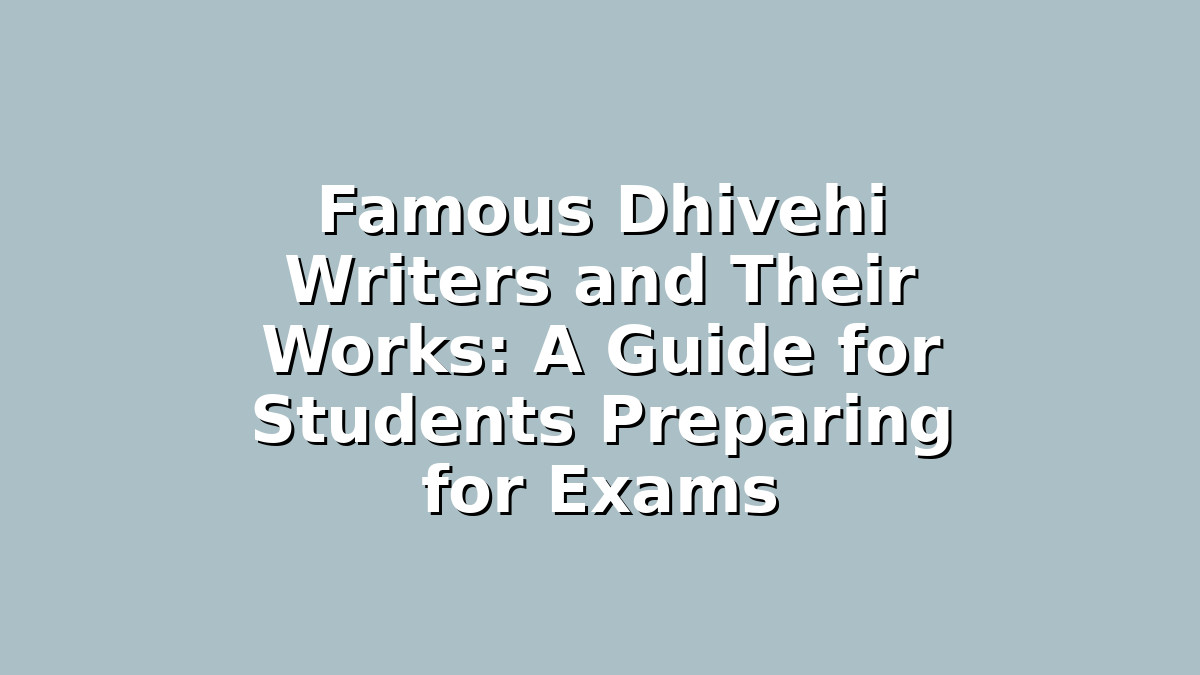When preparing for exams, especially literature or language subjects, understanding the works of famous writers can give you a significant advantage. For students studying Dhivehi language and literature, familiarizing yourself with prominent Dhivehi writers and their contributions is essential. Not only does this knowledge help you excel in exams, but it also deepens your appreciation for Maldivian culture and heritage.
In this article, we will explore some of the most influential Dhivehi writers, their notable works, and how you can effectively study and remember information about them for your exams. Whether you are a high school student or preparing for advanced assessments, this guide offers useful study tips to help you master this important topic.
1. Understanding Key Dhivehi Writers and Their Literary Contributions
Dhivehi literature has a rich history that reflects the culture, traditions, and values of the Maldives. Several writers have played a crucial role in shaping the literary landscape of the country. Here are three famous Dhivehi writers you should know:
a. Mohamed Amin Didi
Often regarded as a pioneer in modern Dhivehi literature, Mohamed Amin Didi was also a political leader who contributed to the development of Dhivehi language and literature. His works include poetry and prose that emphasize national pride and social issues faced by the Maldivian people. Remembering Amin Didi’s contribution helps you understand the evolution of Dhivehi literature from traditional to modern forms.
b. Ibrahim Shihab
Ibrahim Shihab is celebrated for his poetic works and essays. Known for his eloquent writing style, Shihab’s works often reflect philosophical themes, nature, and human emotions. His poetry is frequently studied for its use of imagery and metaphor. For exam preparation, focus on understanding the central themes and stylistic devices used in his poems.
c. Fathimath Saeed
A prominent female voice in Dhivehi literature, Fathimath Saeed has contributed to short stories and novels that explore social dynamics, gender roles, and personal identity. Her narratives offer insight into contemporary Maldivian society and often address challenges faced by women. When studying Saeed’s works, pay attention to character development and the social messages conveyed through her storytelling.
Study Tip: Create flashcards summarizing each writer’s background, major works, and key themes. This makes it easier to review quickly before exams.
2. How to Analyze Dhivehi Literary Works for Exam Success
Analyzing literature might seem daunting, but breaking it down into manageable steps can help you grasp the meaning more effectively. Here’s a step-by-step approach tailored for Dhivehi literature:
a. Read Actively
When you read a poem, story, or essay, highlight or underline unfamiliar words, important lines, and repeated phrases. Take notes in the margins or in a notebook to record your thoughts and questions.
b. Identify Literary Devices
Look for common literary devices like similes, metaphors, personification, and alliteration. For example, Ibrahim Shihab’s poetry often uses vivid imagery to express emotions—try to find and interpret these images.
c. Understand Themes and Messages
Ask yourself what the writer is trying to communicate. Is the work about love, nature, social change, or identity? Understanding the central message is crucial for answering essay questions or writing summaries.
d. Connect to the Context
Think about the historical or cultural background of the work. For instance, Mohamed Amin Didi’s writings may reflect a period of national awakening or political change. Connecting literature to its context helps you write informed answers and impress examiners.
Study Tip: Practice writing short summaries and analyses of each work you study. This reinforces understanding and improves your writing skills for exams.
3. Effective Study Techniques for Remembering Dhivehi Writers and Their Works
To excel in exams, it’s not enough to read the material—you must retain and recall the information effectively. Here are some proven study methods to help you master Dhivehi literature:
a. Use Mind Maps
Create mind maps linking writers to their key works, themes, and literary devices. Visual tools like these help organize information logically and increase retention.
b. Group Study Sessions
Discussing literary works with classmates can provide new perspectives and clarify doubts. Group study also makes learning more engaging, which is important for memorizing details about multiple authors and texts.
c. Teach What You Learn
One of the best ways to remember information is to teach it to someone else. Explain a writer’s contribution or analyze a poem aloud to a friend or family member. This reinforces your own understanding and identifies areas where you need more practice.
d. Regular Revision
Schedule short, frequent review sessions leading up to exams instead of cramming. Repeated exposure to the material over time helps transfer knowledge from short-term to long-term memory.
e. Practice Past Exam Questions
Try answering previous exam questions related to Dhivehi writers and their works. This familiarizes you with the question format and helps you practice articulating your thoughts clearly and concisely under time pressure.
Study Tip: Combine these techniques with healthy study habits such as staying hydrated, taking breaks, and getting enough sleep to maximize your learning potential.
Conclusion
Studying famous Dhivehi writers and their works is not only crucial for exam success but also offers a window into the rich cultural heritage of the Maldives. Writers like Mohamed Amin Didi, Ibrahim Shihab, and Fathimath Saeed have left lasting legacies through their poetry, prose, and stories that continue to inspire and educate.
By applying the study tips outlined in this article—such as active reading, literary analysis, and effective revision techniques—you can approach your exams with confidence and a deeper appreciation for Dhivehi literature. Remember, consistent practice and a positive attitude are key to mastering any subject. Keep exploring, stay curious, and don’t hesitate to seek help when needed. Your hard work will surely pay off!
Good luck with your studies!

Responses